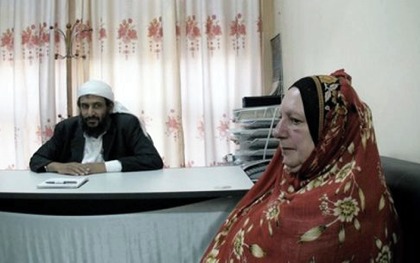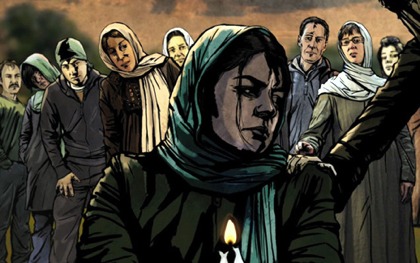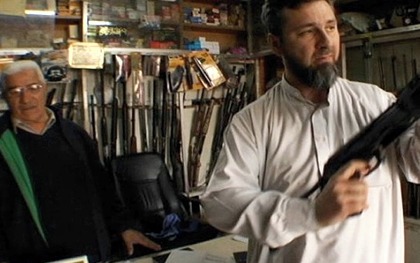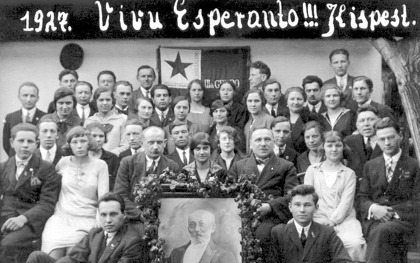Reviews
International Documentary Film Festival Amsterdam 2010 highlights
Jump to a review:
» Arab Attraction
» The Green Wave
» Holy Wars
» Utopia in Four Movements
Arab Attraction

Andreas Horvath, Monika Muscala
Austria, 2010
118 minutes
Like many films at the IDFA, Arab Attraction places the notion of religious belief centre stage. It follows Austrian feminist and atheist Barbara Wally, formerly a key figure at the Salzburg Fine Arts Academy, to discover why she became the second wife of a Yemeni driver, and subsequently a practicing Muslim. While her husband is filmed during a visit to his family in Yemen, Wally is initially shown in her Vienna home and during a business trip to New York, before the film moves on to her new life in her new home country.
The film captures remarkably Wally’s ongoing efforts to accommodate the two worlds to which she belongs – “Whom do I need to marry in order to make sure that I will still be considered a feminist?” she asks at one point – and the way in which her previous life as an art curator is brought into question by her drastic life choice – one that she admits could have been made out of a need for security as she was growing older.
Filmed with assurance, Arab Attraction is a slow, textured account of two dramatically different ways of life, each framed by its own senses of meaningfulness and temporality. Yet there’s a vaguely annoying bias on the part of the two filmmakers, who appear to be less at ease with their subject’s decision than Wally herself: some disingenuous shots of her husband and other believers suggest a roughness or rigidity, in contrast to Wally’s sparkling critique of Western assumptions about femininity. Ultimately, while Wally herself emerges as a person whose sharpness remains unaffected by the abaya, her decision remains largely incomprehensible.
Adina Bradeanu
The Green Wave

Ali Samadi Ahadi
Germany, Iran, 2010
80 mins
Some 20 years after IDFA controversially selected Sylvie Bringas’s animadoc Silence in its competitive Green Wave section, one of the most deeply resonant films in the feature-length competition demonstrated the continued rise of animation in contemporary documentary.
Through a skilful collage of mobile phone footage, animated interludes – confidently drawn, with thick contours ‘frozen’ photographically against moving backgrounds – and Facebook and Twitter messages, Ahadi’s The Green Wave captures the turmoil and waves of dissent that swept Iran in the aftermath of its June 2009 elections. Although not an investigative piece, and probably bringing no new information to those in the know, the film indirectly refutes claims that the tweets that made the green revolution viral came from diasporic Iranians in the West.
During the post-screening conversation the filmmaker insisted that, although he created some fictional characters to add continuity and consistency to the story, all the messages voiced or written on the screen were taken to the letter from tweets written from inside Iran – many deeply distressing expressions of disappointment after the suppression of the movement. “I am leaving a small prison for a much larger one, a prison called Iran,” reads one messages. “I will rebuild you, my homeland, even if I will have to use my own bones for that,” adds another.
Ahadi’s agenda transcends the mere depiction of a particular national drama; he’s reaching for a broader sense of the tides of enthusiasm and subsequent disillusionment that have marked many recent movements of political unrest.
Adina Bradeanu
Holy Wars

Stephen Marshall
Canada, USA, 2010
84 minutes
“There are two things that one should not talk about: religion and politics,” says Stephen Marshall ironically at the beginning of his timely film Holy Wars. Shot on handheld camera and the result of several years spent traveling around the US, England, Pakistan and Lebanon, Holy Wars follows two religious radicals: Missouri-based Christian believer Aaron Taylor and Irish-born Muslim convert Khalil Kelly. In his attempt to understand the fundamentals of the religious beliefs animating his two subjects, Marshall creates a compelling expansion upon the customary glimpses onto fundamentalism offered by the media.
Marshall’s dedication leads to a puzzling mix of distress and hilarity. While the distressing is virtually everywhere in the central figures’ excessive convictions, however, the hilarious pierces through only occasionally, such as when Khalil tells off his young son (Osama) for accidentally hitting him by gently reminding him that he should keep that for two gentlemen called Bush and Blair.
As far as Aaron is concerned the film’s unfolding almost textbook: we witness a deep personal change following an extensive (and largely humiliating) meeting with Khalil. The experience does little to adjust the aggressive Islamic militancy of his Muslim counterpart, however – one reason why the film has been perceived in some quarters as being too overtly pro-Christian.
Yet there’s nothing in Marshall’s balanced voiceover to justify this, and one of the stories that surfaced during an IDFA Q&A session confirmed his openness towards his subjects. While recounting with a smile how both tried to convert him, Marshall remembered a moment in which Khalil burned a piece of wood in order to show him his fate after death if he did not convert. Marshall confessed he remembered that particular moment as the “closest expression to an act of love” he had ever encountered.
Adina Bradeanu
Utopia in Four Movements

Sam Green, Dave Cerf
USA, 2010
65 minutes
This quirky look at ideals of the past century apparently arose from Sam Green’s frustration at technology’s effect on film consumption and cinephilia: the new concept of ‘live documentary’ is meant to keep the audience glued to the theatrical outlet, rather than allowing its migration down digital avenues.
Utopia in Four Movements takes the form of a compilation film screened with a live commentary by Green (aided by sound artist Dave Cerf and a live soundtrack from Brooklyn-based band The Quavers), the whole performance leaning towards the essayistic. In that tradition, Green quotes, hijacks and reorders information, his monologue flicking through grand topics with delight and a taste for paradox, as in the example of Victor Gruen, a committed socialist credited as the inventor of the shopping mall. Yet Green insists he demurs from any historical grand narrative.
The film’s charm lies in the swiftness of Green’s free associations, from the history of Esperanto to Cuban political billboards to the shelves of a trendy New York vegan shop brimming with volumes of The Socialist Register.
The central idea appears to be that we have reached an evolutionary stage in which, with a present like a vast crime scene and a looming dark future, there is no room left for utopias. It remains to be seen whether his nostalgia for the theatrical is not itself a utopian dream that contradicts the very premise of his project (rumours suggested that the performance I attended was more sparkling than that the day before, when the team was still jet-lagged). And the programming of this delectable and thought-provoking piece at the Brakke Grond venue (this year reserved for IDFA’s web docs) is perhaps a sign that new, allegedly ‘anarchic’ documentary forms still need to work their way into the mainstream.
Adina Bradeanu
See also
Santas, waffles and echoes of turmoil: Adina Bradeanu’s postcard from IDFA 2010 (November 2010)
Sheffield Doc/Fest 2010 highlights: The Embrace of the River, Marwencol, Nostalgia for the Light, On the Streets, Scenes from a Teenage Killing and Vapor Trail (Clark) (November 2010)
Rain, speed dates, glamour and fine films: Edward Lawrenson’s postcard from Sheffield Doc/Fest 2010 (December 2010)
Four Lions reviewed by Ben Walters (June 2010)
Every doc for itself: Nick Bradshaw’s report on the 2009 Sheffield Doc/Fest (November 2009)
Afghan aftermath: Dave Calhoun on Siddiq Barmak’s Osama (February 2004)
